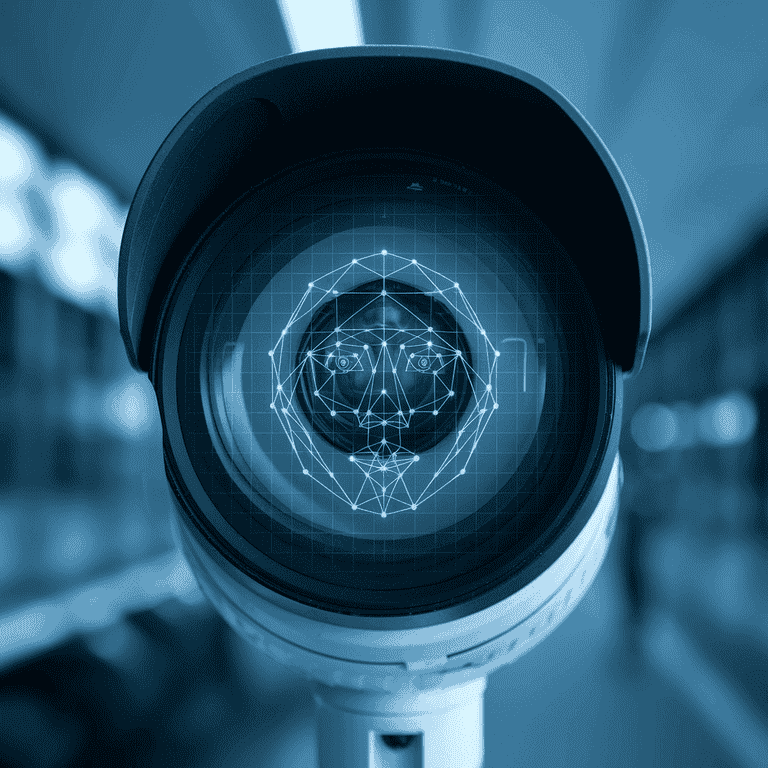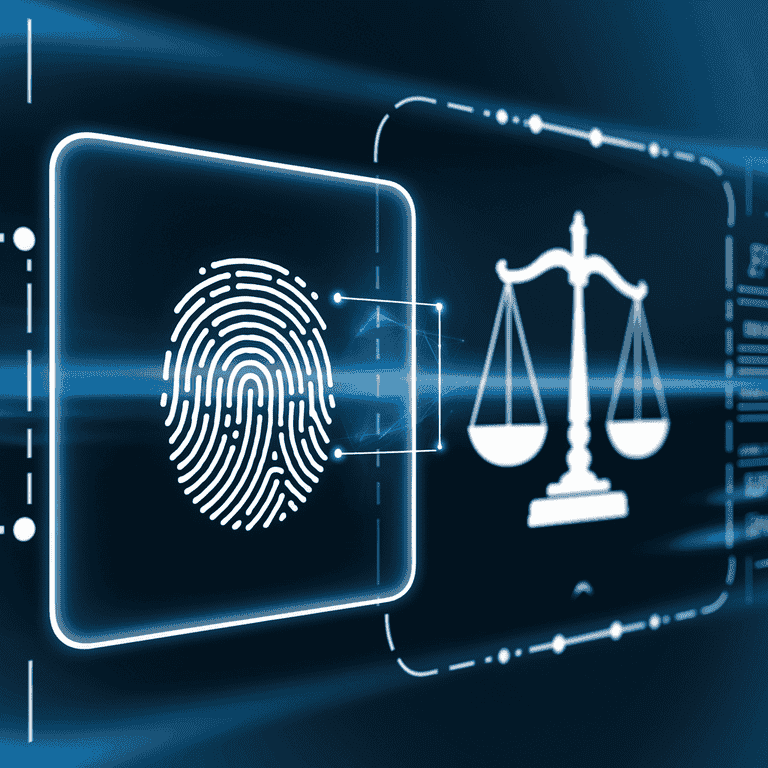Biometric data, like fingerprints and facial recognition, is increasingly used daily. From unlocking your phone to airport security, this technology promises convenience and enhanced security. However, with this growth comes a range of legal and privacy concerns, particularly in Nevada, where laws surrounding biometric data are still evolving. This article explores the legal landscape of biometric data in Nevada, including crucial privacy issues, potential regulations, and what it all means for businesses and individuals.
What is Biometric Data?
Biometric data refers to unique physical or behavioral characteristics used to identify individuals. This technology is increasingly being integrated into various sectors, offering new ways to verify identity quickly and securely.
Common Types of Biometric Data:
- Fingerprints: Used in smartphones, security systems, and employee access controls.
- Facial Recognition: Common in surveillance, airports, and even retail stores for personalized marketing.
- Voiceprints: Utilized in banking and customer service for voice authentication.
- Retina and Iris Scans: Often seen in high-security environments like military facilities.
Biometric data offers unmatched convenience but raises significant concerns about privacy and security. Understanding how this data is regulated, particularly in Nevada, is crucial for businesses and individuals.
Current Biometric Data Laws in Nevada
Nevada has made strides in data privacy laws. However, the state still has much to catch up on when it comes to biometric data compared to other states like Illinois, which has specific biometric information regulations under the Biometric Information Privacy Act (BIPA). In Nevada, the focus remains primarily on broader data protection laws, leaving biometric data in a gray area.
Critical Aspects of Nevada’s Data Privacy Landscape:
- General Data Protection: Nevada’s privacy laws focus mainly on consumer data, requiring businesses to provide notice and obtain consent before collecting personal data.
- Lack of Specific Biometric Laws: Unlike other states, Nevada currently has a specific law that directly regulates the collection, use, or storage of biometric data.
- Consent Requirements: While specific to personal data, Nevada’s existing laws imply that explicit consent is necessary before collecting sensitive information, including biometric data.
Key Privacy Concerns:
- Unauthorized Access: Biometric data can be hacked or stolen, leading to identity theft or unauthorized surveillance.
- Data Misuse: Companies may misuse biometric data, such as using facial recognition data for marketing without consent.
- Lack of Transparency: Many organizations fail to communicate how biometric data is used, stored, and protected, leaving individuals vulnerable.
These concerns underscore the need for more robust regulations, particularly in Nevada, where current laws are not fully equipped to address the unique challenges posed by biometric data.

Facial Recognition Legal Issues in Nevada
Facial recognition technology is rapidly becoming a standard tool in Nevada. It’s used in casinos for security, in airports for streamlined boarding, and even by law enforcement agencies. While these uses promise safety and efficiency, they also bring significant legal and ethical concerns that Nevada law has yet to address fully.
How Facial Recognition is Used in Nevada
- Security and Surveillance: Casinos and other high-security venues use facial recognition to monitor visitors and detect potential threats.
- Retail and Marketing: Some stores use facial recognition to identify repeat customers and tailor marketing efforts.
- Law Enforcement: Police departments use facial recognition to identify suspects and solve crimes more quickly.
Legal Issues Specific to Facial Recognition
Facial recognition is not just about identifying faces; it’s about collecting, storing, and using sensitive data. In Nevada, the legal landscape is still catching up to this rapidly evolving technology.
Key Legal Issues:
- Lack of Consent: Many individuals must be aware that their facial data is being collected and stored, raising concerns about privacy violations.
- Surveillance and Civil Liberties: The widespread use of facial recognition by law enforcement can feel like Big Brother is watching, leading to fears of constant surveillance and erosion of personal freedoms.
- Bias and Accuracy: Facial recognition technology has been criticized for inaccuracies, especially when identifying women and people of color, leading to potential wrongful accusations or discrimination.
Despite these significant concerns, Nevada has yet to implement specific regulations addressing legal issues related to facial recognition. As technology grows, there’s a pressing need for clear rules to protect citizens’ rights.
Fingerprint Privacy in Nevada
Fingerprint technology is one of the oldest and most widely used forms of biometric data. It’s utilized everywhere, from unlocking smartphones to accessing secure locations. In Nevada, fingerprint data is widespread in the workplace, law enforcement, and various security systems.
Use of Fingerprint Technology in Nevada
- Employment and Background Checks: Employers often require fingerprint scans for background checks, particularly in industries like healthcare, education, and finance.
- Security Access: Businesses and government facilities use fingerprint scanners to control access to sensitive areas.
- Law Enforcement: Police departments collect and use fingerprints for criminal investigations during arrests.
Legal Standards for Fingerprint Privacy
Nevada has yet to establish a specific law addressing fingerprint privacy, unlike other states that impose strict regulations on how this sensitive data is handled.
Privacy Challenges with Fingerprint Data:
- Permanent Data: Unlike passwords, fingerprints cannot be changed if compromised, making data breaches particularly concerning.
- Data Misuse: Employers and businesses can misuse fingerprint data by sharing it without consent or failing to secure it properly.
- Lack of Transparency: Individuals often need to learn where their fingerprint data is stored or how it is protected, increasing the risk of misuse.
Nevada’s lack of specific laws leaves many questions unanswered regarding fingerprint privacy. The state’s existing privacy laws provide some protection, but individuals are left vulnerable without clear guidelines.

Biometric Information Regulations in Nevada
Biometric information regulations are crucial in protecting the privacy and security of personal data. Unfortunately, Nevada’s approach remains fragmented and less comprehensive than other states. While general privacy laws are in place, the state has yet to enact specific legislation targeting biometric data.
Overview of Current Regulations
- General Privacy Laws: Nevada’s existing laws primarily focus on consumer privacy and data protection. They cover a broad range of personal data but lack specific biometric data provisions.
- Consent and Notice Requirements: Nevada requires businesses to inform consumers about data collection and allow them to opt-out, but these rules are not tailored to the unique aspects of biometric data.
Pending Legislation and Future Changes
There are growing discussions in Nevada’s legislature about the need for specific biometric information regulations. These proposed changes could include:
- Explicit Consent Requirements: Mandating clear, informed consent before collecting biometric data.
- Strict Data Security Standards: Setting requirements for how biometric data should be stored and protected.
- Right to Sue: Allowing individuals to take legal action if their biometric data is mishandled.
Potential Impacts of New Regulations:
- For Businesses: Stricter rules could mean more compliance costs and greater consumer trust.
- For Individuals: New laws could provide more robust protections, giving people more control over their biometric data.
As Nevada grapples with the challenges of regulating biometric data, these potential changes could significantly impact how businesses collect and use this sensitive information.
Future of Biometric Data Laws in Nevada
The use of biometric data is only going to grow. These technologies are becoming a staple of modern life, from new tech gadgets to advanced security systems. However, with this growth comes the pressing need for more comprehensive laws and regulations, especially in states like Nevada, where current biometric data laws lag behind the technology.
Predictions for Future Biometric Data Laws
As awareness of privacy concerns grows, Nevada is likely to see new legislation targeting collecting and using biometric data. Here are some potential future developments:
- More robust Consent Requirements: Future laws may demand more explicit, informed consent before businesses can collect biometric data, ensuring that individuals know precisely what is being done with their information.
- Enhanced Data Security Measures: Nevada could implement stricter standards for storing and protecting biometric data, reducing the risk of data breaches and misuse.
- Right to Opt-Out: Potential regulations include the right for individuals to opt out of biometric data collection, giving them more control over their personal information.
- Regulations on Data Retention: Laws may establish clear guidelines on how long companies can keep biometric data and when it must be deleted.
These changes would bring Nevada closer to states with more rigorous biometric information regulations, providing greater protection for residents.

Impact of Technological Advancements on Legal Frameworks
Technology is evolving faster than the laws can keep up. Innovations in artificial intelligence, machine learning, and biometric recognition are pushing the boundaries of what’s possible and permissible.
How Technological Advancements Could Shape Laws:
- AI and Machine Learning: As AI becomes more sophisticated, it will be crucial to regulate how these technologies handle biometric data to prevent biases and errors.
- Wearable Tech and IoT Devices: With the rise of wearable devices that collect biometric data, new regulations must address these technologies’ unique privacy concerns.
- Biometric Payment Systems: Using biometric data for payments, like fingerprint or facial recognition payments, will likely require specific regulations to protect financial and personal information.
These advancements highlight the need for Nevada’s legal frameworks to evolve rapidly to keep pace with technology, ensuring that privacy rights are not left behind.
Recommendations for Compliance with Evolving Laws
Both businesses and individuals need to stay ahead of the curve as biometric data laws continue to develop. Here are some practical tips to ensure compliance and protect personal data:
For Businesses:
- Conduct Privacy Impact Assessments: Regularly evaluate how your organization collects and uses biometric data and identify potential privacy risks.
- Implement Robust Security Measures: Use encryption, secure storage, and other data protection methods to safeguard biometric information.
- Stay Informed on Legal Changes: Follow new laws and adjust your data policies to remain compliant with evolving regulations.
For Individuals:
- Be Mindful of Sharing Biometric Data: Only provide biometric data to trusted sources, and be aware of how it will be used.
- Understand Your Rights: Familiarize yourself with existing privacy laws and any new legislation affecting your biometric data rights.
- Opt-Out When Possible: If you’re uncomfortable providing biometric data, exercise your right to opt out whenever possible.
These recommendations can help businesses and individuals navigate the shifting landscape of biometric data laws in Nevada, ensuring that privacy and compliance are in balance.

Breaking It All Down
Biometric data offers incredible benefits, from convenience to enhanced security. But as this technology becomes more ingrained in our daily lives, it’s vital to understand the legal implications, especially in states like Nevada, where specific biometric data laws are still developing.
With privacy concerns at the forefront, the push for comprehensive regulations continues to grow. Both businesses and individuals must stay informed and proactive, adapting to new laws and embracing best practices to protect sensitive biometric information. As Nevada moves toward a more regulated future, balancing innovation with privacy will be vital to ensuring the responsible use of biometric data.

Frequently Asked Questions
What types of biometric data are commonly used in Nevada?
Biometric data commonly used in Nevada includes fingerprints, facial recognition, voiceprints, and retina scans. These technologies are often employed in security, law enforcement, and customer service sectors.
Are there any specific laws regulating biometric data in Nevada?
Currently, Nevada does not have specific laws regulating biometric data. The state’s privacy laws cover broader data protection, but there are no targeted regulations for biometric data like those seen in Illinois or Texas.
Why is there concern about the use of biometric data?
Concerns arise from the potential for unauthorized access, misuse, and a lack of transparency regarding how biometric data is collected, stored, and protected. Biometric data is unique and permanent, making breaches and unauthorized use particularly troubling.
Is facial recognition technology legal in Nevada?
Yes, facial recognition technology is legal in Nevada, but it operates in a legal gray area due to the lack of specific biometric data regulations. This lack of regulation raises concerns about privacy, consent, and surveillance.
Can individuals opt out of providing biometric data in Nevada?
Currently, Nevada law does not specifically address the right to opt out of biometric data collection. However, general privacy laws may offer some avenues for consumers to refuse or limit data collection by certain businesses.
What are the risks associated with fingerprint data?
Fingerprint data is susceptible to misuse, hacking, and unauthorized access. Because fingerprints are permanent, once compromised, they cannot be changed like a password, making breaches particularly damaging.
What might future biometric data laws in Nevada include?
Future laws could include stronger consent requirements, stricter data security standards, the right to opt out, and clear rules on data retention and deletion. These changes aim to provide better protection for personal biometric information.
How can businesses comply with current and future biometric data laws?
Businesses should implement robust security measures, conduct privacy impact assessments, and stay updated on legal changes. It’s also important to ensure clear communication with customers about how their biometric data is used and protected.
What should individuals do to protect their biometric data?
Individuals should be cautious about sharing biometric data, stay informed about their rights, and opt out of data collection when they feel uncomfortable. It’s important to only provide biometric data to trusted sources and be aware of how it will be used.
How does biometric data compare to other types of personal data in terms of privacy concerns?
Biometric data is unique because it is permanent and highly personal, unlike passwords or other personal data that can be changed if compromised. This makes privacy concerns around biometric data more serious, as breaches can have long-lasting impacts.

Additional Resources for You from The Rosenblum Allen Law Firm.
Molly Rosenblum Allen, Esq., is dedicated to supporting you in your time of need. In addition to information about biometric data laws, Molly has created a variety of other resources to help you navigate complex legal issues. If you or a loved one are facing challenges, these guides can provide valuable insights and support:
- Criminal Defense Attorneys: Effective legal representation for all criminal charges.
- Las Vegas DUI Lawyer: Guidance and defense for DUI charges in Las Vegas.
- Domestic Violence Lawyer Las Vegas: Support for those facing domestic violence accusations.
- Drug Possession Lawyer: Legal defense for drug possession charges.
- Sex Crimes Attorney: Compassionate and skilled representation for sensitive sex crime cases.
- CPS Defense Attorney: Defending clients in child abuse, neglect, and CPS cases.
- Misdemeanor Lawyer: Defense against misdemeanor charges.
- Las Vegas Warrant Defense Attorney: Assistance with warrant-related legal issues in Las Vegas.
- Las Vegas Probation Violation Attorney: Defense for probation violations in Las Vegas.
- Theft Crime Defense Lawyer: Legal help for theft-related charges.
- Kidnapping Lawyers: Skilled defense in kidnapping cases.
- Juvenile Defense Lawyers: Representation for juveniles facing criminal charges.
- Firearms Lawyer Las Vegas: Effective guidance on firearms-related legal issues.

Offsite Resources for You
Electronic Frontier Foundation (EFF): EFF is dedicated to defending civil liberties in the digital world, offering insights on data privacy, biometric technology, and the legal implications of digital surveillance.
Privacy Rights Clearinghouse: Privacy Rights Clearinghouse provides educational resources about consumer privacy issues, including biometric data protection and how to manage your digital footprint.
American Civil Liberties Union (ACLU): ACLU focuses on defending individual rights and liberties, including the right to privacy and legal concerns surrounding surveillance and biometric data.
BiometricUpdate.com: Biometric Update offers news and analysis on the global biometric technology industry, keeping you informed about the latest trends, regulations, and privacy issues.
International Association of Privacy Professionals (IAPP): IAPP is the world’s largest association for data privacy professionals, offering resources and training on data protection laws, including biometric information.
Center for Democracy & Technology (CDT): CDT advocates for privacy and civil liberties, focusing on the impact of emerging technologies like biometric data on individual rights.
Future of Privacy Forum (FPF): FPF is a think tank that provides research and resources on data privacy, with a focus on biometric data, consumer rights, and regulatory developments.

A Special Message from Our Lead Attorney, Molly Rosenblum Allen, Esq

Thank you for taking the time to read through these resources. I hope you found the information helpful as you navigate your legal concerns. If you have any questions or need personalized guidance, my team and I are here to assist you. Don’t hesitate to reach out to us at (702) 433-2889. We’re ready to help you get the ball rolling on your situation. We look forward to speaking with you soon.
Warm regards,
Molly Rosenblum Allen, Esq.
The Rosenblum Allen Law Firm






